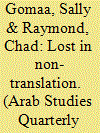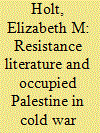| Srl | Item |
| 1 |
ID:
129499


|
|
|
|
|
| Publication |
2014.
|
| Summary/Abstract |
Undergraduate college student in the USA often encounter the Arab Middle East through novels translated into English. These novels are often presented by instructors and understood by students as stylized but accurate depictions of Arab societies as they currently exist. This article argues that the extremely limited number of translated Arabic novels that have made their way into American classrooms perpetuate stereotypes about Arab societies. These novels present student with themes that are often a historical and infused with violence, misogyny, and religious fanaticism. Although students may be highly interested in learning about Arab societies, the literary content they come across encourages affective rather than critical or complex responses.
|
|
|
|
|
|
|
|
|
|
|
|
|
|
|
|
| 2 |
ID:
178330


|
|
|
|
|
| Summary/Abstract |
For the last decade of his life, the Palestinian intellectual, author, and editor Ghassan Kanafani (d. 1972) was deeply immersed in theorizing, lecturing, and publishing on Palestinian resistance literature from Beirut. A refugee of the 1948 war, Kanafani presented his theory of resistance literature and the notion of “cultural siege” at the March 1967 Beirut conference of the Soviet-funded Afro-Asian Writers Association (AAWA). Articulated in resistance to Zionist propaganda literature and in solidarity with Marxist-Leninist revolutionary struggles in the Third World, Kanafani was inspired by Maxim Gorky, William Faulkner, and Mao Zedong alike. In books, essays, and lectures, Kanafani argued that Zionist propaganda literature served as a “weapon” in the war against Palestine, returning repeatedly to Arthur Koestler’s 1946 Thieves in the Night. Better known for his critique of Stalinism in Darkness at Noon (1940), Koestler was also actively involved in waging cultural Cold War, writing the United States Central Intelligence Agency’s (CIA) Congress for Cultural Freedom 1950 manifesto and helping the organization infiltrate Afro-Asian writing in the wake of Bandung. Kanafani’s 1960s theory of resistance literature thus responded at once to the psychological dislocation of Zionist propaganda fiction and the cultural infiltration of Arabic literature in the Cold War.
|
|
|
|
|
|
|
|
|
|
|
|
|
|
|
|
| 3 |
ID:
156627


|
|
|
|
|
| Summary/Abstract |
: Youssef Ziedan’s controversial novel Azazeel follows an anonymous narrator’s
journey from Upper Egypt to Aleppo during the first half of the fifth-century AD. This article
argues that descriptions of landscape enable the narrator to articulate personal and
historical crises otherwise censored or repressed. By incorporating geographical features
into his identity, the narrator creates a poetic version of himself free from the hegemony
of the dominant religious discourse. The search for a free, private space shapes the novel’s
aesthetic as well as political concerns. Overall, Azazeel is an important novel because of its
literary value, its denouncement of geopolitical definitions of God, and its ability to place
the history of religious violence in Egypt within the global context
|
|
|
|
|
|
|
|
|
|
|
|
|
|
|
|